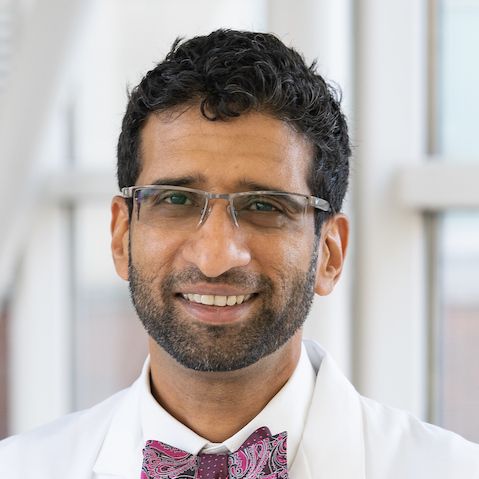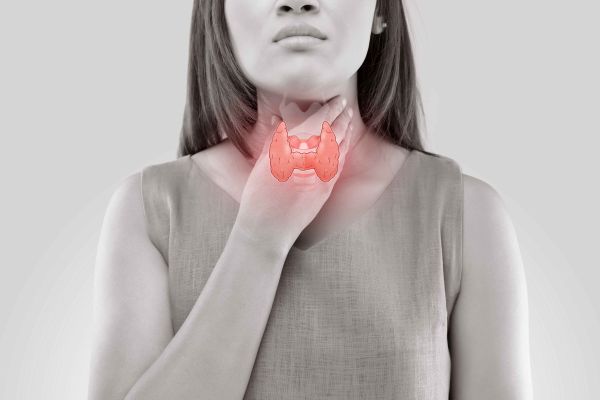Be sure to tell your physician about any symptoms or risk factors that you have.
Your small thyroid gland sits in the front of your neck, just above your collarbone. Among other jobs, it manages your metabolism, digestion, body temperature, mood and excitability, pulse and heart rate. (Whew!) That’s why you should not take the little butterfly-shaped endocrine gland for granted – especially when it comes to thyroid cancer.
“Thyroid cancer doesn’t cause any symptoms in its early stages,” says Vishal Gupta, MD, surgical oncologist, Head & Neck/Plastic & Reconstructive Surgery at Roswell Park Comprehensive Cancer Center. “But there is currently no recommended screening for thyroid cancer in the general population.
“There isn’t a standard test everyone gets at a certain age. This means it can be difficult to detect, and early detection is important for improving the chances of a successful treatment outcome.”
Women at higher risk for thyroid cancer
Thyroid cancer is relatively uncommon, accounting for only 1% of all types of diagnosed cancers. It occurs in people of all ages. In most cases it can be treated effectively, and most patients can look forward to a normal lifespan.
However, women are diagnosed with thyroid cancers three times more often than men, usually when they are in their 40s and 50s. Men are usually diagnosed in their 60s or 70s.
For both women and men, general conditions that may increase the risk of developing thyroid cancers include:
- Family history
- Exposure to radiation during childhood – through X-rays or radiation therapy
- Insufficient dietary iodine
- Obesity
- Hereditary conditions – including medullary thyroid cancer (MTC), which results from inheriting an abnormal gene; and familial medullary thyroid cancer (FMTC), which can occur alone or with other tumors
Under certain conditions, people who have had breast cancer may also be more susceptible to developing thyroid cancer. “Research suggests breast cancer survivors have a roughly two-fold increased risk of developing thyroid cancer compared to the general population.” Dr. Gupta says.
Conditions that potentially put breast cancer survivors at a higher risk for thyroid cancers include shared genetic factors — the presence of genes involved in both breast and thyroid cancer — and radiation therapy to the chest or neck area. This is why women with a history of radiation therapy to the chest have their thyroid checked as part of their Survivorship care at Roswell Park. "We palpate the thyroid during the physical exam and if we note any enlargement or nodules, we do more tests," says Tessa Flores, MD, Medical Director of Cancer Screening and Survivorship at Roswell Park. "Having said that, it's important to know that these findings are usually benign and not a concern."
“Having risk factors doesn’t guarantee you’ll develop thyroid cancer, but it’s essential to stay informed and seek medical advice if needed,” advises Dr. Gupta.
Thyroid cancer symptoms and diagnosis
The most common symptom of thyroid cancer is a lump in your neck, usually painless, but which may grow over time. Other symptoms include:
- Changes to your voice, such as hoarseness
- Difficulty swallowing
- Pain in your neck or throat
- Swollen lymph glands in your neck
- Feeling that close-fitting collars are becoming too tight
“These symptoms can also be caused by other conditions. But if you are persistently experiencing any of these symptoms, it’s important to see your doctor to get a diagnosis,” Dr. Gupta says.
If you are experiencing symptoms and a physical exam suggests that you have swollen lymph nodes in your neck or a lump on your thyroid gland, your doctor will likely order imaging tests to provide additional information that will be important for an accurate diagnosis. These tests may include:
- Blood tests
- X-ray
- Ultrasound
- Computed tomography (CT) scan
- Magnetic resonance imaging (MRI)
- Positron emission tomography (PET) scan
- Radioiodine scan
Your doctor also may want you to undergo a biopsy. Also called fine-needle aspiration (FNA), a biopsy is a procedure in which a very thin needle is inserted into the suspicious area to draw cells into a syringe. (You may or may not need a numbing medication before the FNA.) A pathologist will examine those cells in the laboratory to determine if cancer is present.
“If you have a family history of certain types of thyroid cancer, like medullary thyroid cancer or a genetic condition like MEN 2, your doctor might recommend blood tests or ultrasounds to monitor for early signs,” says Dr. Gupta.
Genetic testing
Does cancer run in your family? Learning about your genes is just the first step. Having this knowledge is important and powerful and can save your life.
Why Roswell Park for thyroid cancer
Roswell Park is a National Cancer Institute-designated comprehensive center that offers expert, individualized care for thyroid diseases, including cancer.
“Our specialists evaluate each patient’s condition, discuss all treatment options and design a comprehensive, individualized treatment plan that fits the patient’s specific needs and lifestyle. We are committed to providing care for the whole person, not just the disease,” Dr. Gupta says.




